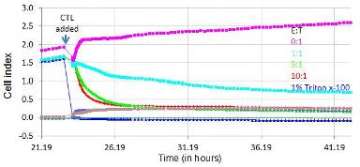Real-Time Cell Lysis and Cell Proliferation
Services Provided
The ACEA xCELLigenceTM Technology uses a microelectronic biosensor system to monitor cellular events in real time without the incorporation of labels. The instruments measure electrical impedance across interdigitated micro-electrodes integrated on the bottom of its special tissue culture plates. xCELLigence comprises a measurement unit housed within a standard tissue culture incubator. It continuously monitors electrical impedance over the entire time period (30 minutes to 72 hours) of the experiment to obtain dynamic real-time data. The real-time impedance measurement improves on conventional endpoint assays and provides quantitative information about the biological status of the cells, including cell number, adhesion, viability, and morphology. xCELLigence has wide applications, most notably in the measurement of drug or cell mediated cytotoxicity, virus-mediated cytopathogenicity, cell proliferation, cell adhesion and migration. The IAC is equipped with the xCELLigence RTCA MP System and the xCELLigence RTCA DP System. Visit the ACEA™ website for a complete list of xCelligence applications.
Using xCELLigence system, we currently offer two assay types: tumor specific cytotoxic T lymphocyte or NK cell killing assays, which provide up to four times the sensitivity of traditional dye-release methods; and stimulus-induced cell proliferation and proliferation inhibition assays, which measure real-time cell killing, cell proliferation, and morphological changes of adherent cells with high sensitivity. An example is provided below (Figure 1). Researchers are welcomed to set up their custom assays in our tissue culture facility and run the plates on our instruments.

Figure 1. Cytotoxicity to cancer cells by cytotoxic T lymphocyte (CTL). xCELLigence real time impedance plots at various effector target ratio (E:T 0:1). Negative control: cancer cells only. Positive control: cancer cells lysed with 1% triton x-100.
Experiment design: 16-well CIM plates and 16-well E-plates are used for the DP system; 96-well E-plates are used for the MP system. It is recommended to run samples in multiple replicates. The latter, for example, is capable of testing 30 experimental conditions in triplicate (not including negative and positive controls). Proper negative and positive controls should be included in each run. The E-plates are not intended for multiple uses.